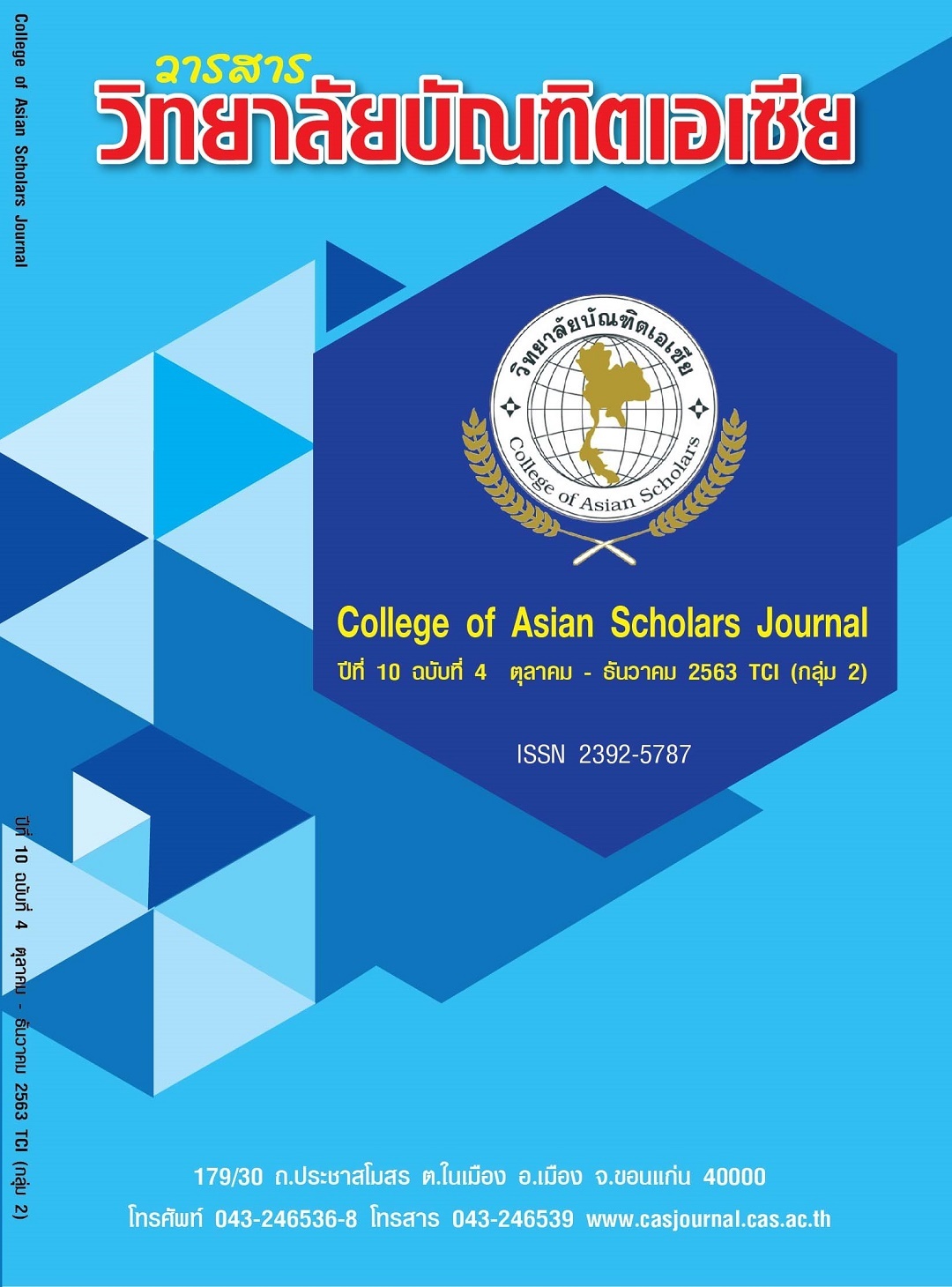ปีที่ 10
ฉบับที่ 4
เดือน ตุลาคม - ธันวาคม ปี พ.ศ. 2563
ไฟล์ ดาวน์โหลด |
1613382339-9-ED056-T(75-83).pdf |
|||||||||
|
ชื่อผู้วิจัย ศศิธร เอี่ยมทองคำ
|
|||||||||
| บทคัดย่อ ภาษาไทย |
การวิจัยครั้งนี้มีวัตถุประสงค์เพื่อ (1) พัฒนาแผนการจัดกิจกรรมการเรียนรู้ด้วยเทคนิคการเรียนรู้โดยใช้สมองเป็นฐาน (Brain-Based Learning) ร่วมกับการจำคำศัพท์เทคนิคนีมโมนิคส์ (Mnemonics) เพื่อพัฒนาทักษะการอ่าน วิชาภาษาอังกฤษ เรื่อง เทศกาลและงานฉลองของนักเรียนชั้นประถมศึกษาปีที่ 3 ให้มีประสิทธิภาพตามเกณฑ์ที่กำหนด 80/80 (2) ศึกษาค่าดัชนีประสิทธิผลการจัดกิจกรรมการเรียนรู้ด้วยเทคนิคการเรียนรู้โดยใช้สมองเป็นฐานร่วมกับการจำคำศัพท์เทคนิค นีมโมนิคส์ (3) เปรียบเทียบทักษะการอ่านก่อนเรียนและหลังเรียนของนักเรียนที่เรียนโดยการจัดกิจกรรมการเรียนรู้ด้วยเทคนิคการเรียนรู้โดยใช้สมองเป็นฐานร่วมกับการจำคำศัพท์เทคนิคนีมโมนิคส์ และ (4) ประเมินความพึงพอใจต่อการจัดกิจกรรมการเรียนรู้ด้วยเทคนิคการเรียนรู้โดยใช้สมองเป็นฐานร่วมกับการจำคำศัพท์เทคนิคนีมโมนิคส์ ของนักเรียนชั้นประถมศึกษาปีที่ 3 กลุ่มเป้าหมายที่ใช้ในการศึกษา คือ นักเรียนระดับชั้นประถมศึกษาที่ 3 ภาคเรียนที่ 2 ปีการศึกษา 2562 โรงเรียนชุมชนบ้านห้วยหลัว อำเภอบ้านม่วง จังหวัดสกลนคร จำนวน 21 คน เครื่องมือที่ใช้ในการศึกษาประกอบด้วย (1) แผนการจัดการเรียนรู้ โดยใช้เป็นการจัดกิจกรรมการเรียนรู้ด้วยเทคนิคการเรียนรู้โดยใช้สมองเป็นฐานร่วมกับการจำคำศัพท์เทคนิคนีมโมนิคส์ เพื่อพัฒนาทักษะการอ่าน (2) แบบทดสอบวัดทักษะการอ่านก่อนเรียนและหลังเรียน (3) แบบประเมินความพึงพอใจที่มีต่อการจัดกิจกรรมการเรียนรู้ด้วยเทคนิคการเรียนรู้โดยใช้สมองเป็นฐานร่วมกับการจำคำศัพท์เทคนิคนีมโมนิคส์ สถิติที่ใช้ในการวิเคราะห์ข้อมูล ได้แก่ ค่าเฉลี่ย ร้อยละ ส่วนเบี่ยงเบนมาตรฐาน ค่าดัชนีประสิทธิผล และการเปรียบเทียบหาค่าเฉลี่ย (t-test) ผลการวิจัยพบว่า 1) ประสิทธิภาพการจัดกิจกรรมการเรียนรู้ด้วยเทคนิคการเรียนรู้โดยใช้สมองเป็นฐานร่วมกับการจำคำศัพท์เทคนิคนีมโมนิคส์ของนักเรียนชั้นประถมศึกษาที่ 3 จากแบบทดสอบระหว่างเรียนทั้งหมด (E1) และประสิทธิภาพของผลลัพธ์ (E2) หลังเรียนมีค่า E1/ E2 ที่ระดับ 81.54 /91.90 ซึ่งสูงกว่าเกณฑ์ที่กำหนด 80/80 2) ดัชนีประสิทธิผลในการจัดกิจกรรมการเรียนรู้การเรียนรู้ด้วยเทคนิคการเรียนรู้โดยใช้สมองเป็นฐานร่วมกับการจำคำศัพท์เทคนิคนีมโมนิคส์ มีค่าดัชนีประสิทธิผลในการเรียนรู้ (E.I.) โดยรวมเท่ากับ 0.5612 แสดงว่านักเรียนชั้นประถมศึกษาปีที่ 3 มีความรู้เพิ่มขึ้น คิดเป็นร้อยละ 56.12 3) นักเรียนประถมศึกษาปีที่ 3 มีทักษะการอ่านก่อนเรียนและหลังเรียนจากการจัดกิจกรรมการเรียนรู้ด้วยเทคนิคการเรียนรู้โดยใช้สมองเป็นฐานร่วมกับการจำคำศัพท์เทคนิคนีมโมนิคส์ พบว่า มีคะแนนสูงขึ้นและจากการทดสอบค่า t-test พบว่า คะแนนทดสอบก่อนเรียนมีค่าเฉลี่ยเท่ากับ ( =20.61, S.D.= 7.07) และคะแนนทดสอบหลังเรียนมีค่าเฉลี่ย เท่ากับ ( =29.09, S.D.= 7.52) แสดงว่านักเรียนมีทักษะการอ่านหลังเรียนสูงกว่าก่อนเรียนแตกต่างกันอย่างมีนัยสำคัญทางสถิติที่ระดับ .01 4) นักเรียนประถมศึกษาปีที่ 3 มีความพึงพอใจต่อการจัดกิจกรรมการเรียนรู้ด้วยเทคนิคการเรียนรู้โดยใช้สมองเป็นฐานร่วมกับการจำคำศัพท์เทคนิคนีมโมนิคส์ เพื่อพัฒนาผลทักษะการอ่าน เรื่อง เทศกาลและงานฉลอง โดยรวมค่าเฉลี่ยอยู่ในระดับมากที่สุด |
|||||||||
| คำสำคัญ | ||||||||||
| บทคัดย่อ ภาษาอังกฤษ | This study aimed to: 1) develop lesson plans on Brain-Based Learning with Mnemonics techniques to develop English reading skills on the topic of festivals and celebrations for Prathomsuksa 3 students at criteria at 80/80, 2) study the effectiveness index of Brain-Based Learning with Mnemonics techniques, 3) compare English reading skills between before and after of the students by Brain-Based Learning with Mnemonics techniques, and 4) study the satisfaction towards learning outcomes through Brain- Based Learning with Mnemonics techniques of Prathomsuksa 3 students. The target groups used in this study were the 21 Prathomsuksa 3 students who studied in the second semester of the academic year 2019, Choomchon Banhuailau School, Ban Moung District, Sakon Nakhon Province. The research instruments used in the study consisted of 1) the 4 lesson plans by using Brain-Based Learning with Mnemonics techniques to develop English reading skills, 2) English reading skills test before and after learning, and 3) the satisfaction evaluation from Brain-Based Learning with Mnemonics techniques. Data analyzing by percentage, standard deviation Index of Effectiveness, and t-test was used to test the hypothesis. The research results: 1. The efficacy of lesson plans on Brain-Based Learning with Mnemonics techniques to develop English reading skills on the topic of festivals and celebrations for Prathomsuksa 3 students, from the test during the whole course (E1) and the efficacy of the results (E2) after the class E1/E2 was the level of 81.54 / 91.90. It was higher than the criteria set 80/80. 2. The effectiveness index of Brain-Based Learning with Mnemonics techniques, the overall effectiveness of learning (E.I.) was 0.5612, indicating that Prathomsuksa 3 students knowledge increased to 56.12 percent. 3. The English reading skills of the students after learning by Brain-Based Learning with Mnemonics techniques showed that the test scores before studying was ( =20.61, S.D.= 7.07), post-tests scores was ( =29.09, S.D.= 7.52), indicating that overall, students were higher than before learning. The statistically significant was differences at the .01 level. 4. The satisfaction of the Prathomsuksa 3 students towards Brain Based Learning with Mnemonics techniques to develop English reading skills on the topic of festivals and celebrations was at the highest level. This study aimed to: 1) develop lesson plans on Brain-Based Learning with Mnemonics techniques to develop English reading skills on the topic of festivals and celebrations for Prathomsuksa 3 students at criteria at 80/80, 2) study the effectiveness index of Brain-Based Learning with Mnemonics techniques, 3) compare English reading skills between before and after of the students by Brain-Based Learning with Mnemonics techniques, and 4) study the satisfaction towards learning outcomes through Brain- Based Learning with Mnemonics techniques of Prathomsuksa 3 students. The target groups used in this study were the 21 Prathomsuksa 3 students who studied in the second semester of the academic year 2019, Choomchon Banhuailau School, Ban Moung District, Sakon Nakhon Province. The research instruments used in the study consisted of 1) the 4 lesson plans by using Brain-Based Learning with Mnemonics techniques to develop English reading skills, 2) English reading skills test before and after learning, and 3) the satisfaction evaluation from Brain-Based Learning with Mnemonics techniques. Data analyzing by percentage, standard deviation Index of Effectiveness, and t-test was used to test the hypothesis.
The research results:
1. The efficacy of lesson plans on Brain-Based Learning with Mnemonics techniques to develop English reading skills on the topic of festivals and celebrations for Prathomsuksa 3 students, from the test during the whole course (E1) and the efficacy of the results (E2) after the class E1/E2 was the level of 81.54 / 91.90. It was higher than the criteria set 80/80.
2. The effectiveness index of Brain-Based Learning with Mnemonics techniques, the overall effectiveness of learning (E.I.) was 0.5612, indicating that Prathomsuksa 3 students knowledge increased to 56.12 percent.
3. The English reading skills of the students after learning by Brain-Based Learning with Mnemonics techniques showed that the test scores before studying was ( =20.61, S.D.= 7.07), post-tests scores was ( =29.09, S.D.= 7.52), indicating that overall, students were higher than before learning. The statistically significant was differences at the .01 level.
4. The satisfaction of the Prathomsuksa 3 students towards Brain Based Learning with Mnemonics techniques to develop English reading skills on the topic of festivals and celebrations was at the highest level.
|
|||||||||
| Keyword | Brain Based Learning, Mnemonics, learning plan, English reading skills, effectiveness index, satisfaction on Learning activities | |||||||||
ศศิธร เอี่ยมทองคำ
1 บทความ| ชื่อ - สกุล | วารสาร | ไฟล์ |
หน้า |
|
|---|---|---|---|---|

|
ศศิธร เอี่ยมทองคำ CAS1019 |
การจัดกิจกรรมการเรียนรู้ด้วยเทคนิคการเรียนรู้โดยใช้สมองเป็นฐาน (Brain-Based Learning) ร่วมกับการจำคำศัพท์เทคนิคนีมโมนิคส์ (Mnemonics) เพื่อพัฒนาทักษะการอ่าน วิชาภาษาอังกฤษ เรื่อง เทศกาลและงานฉลอง ของนักเรียนชั้นประถมศึกษาปีที่ 3 |

.jpg)
.1.jpg)
1.jpg)
1.jpg)